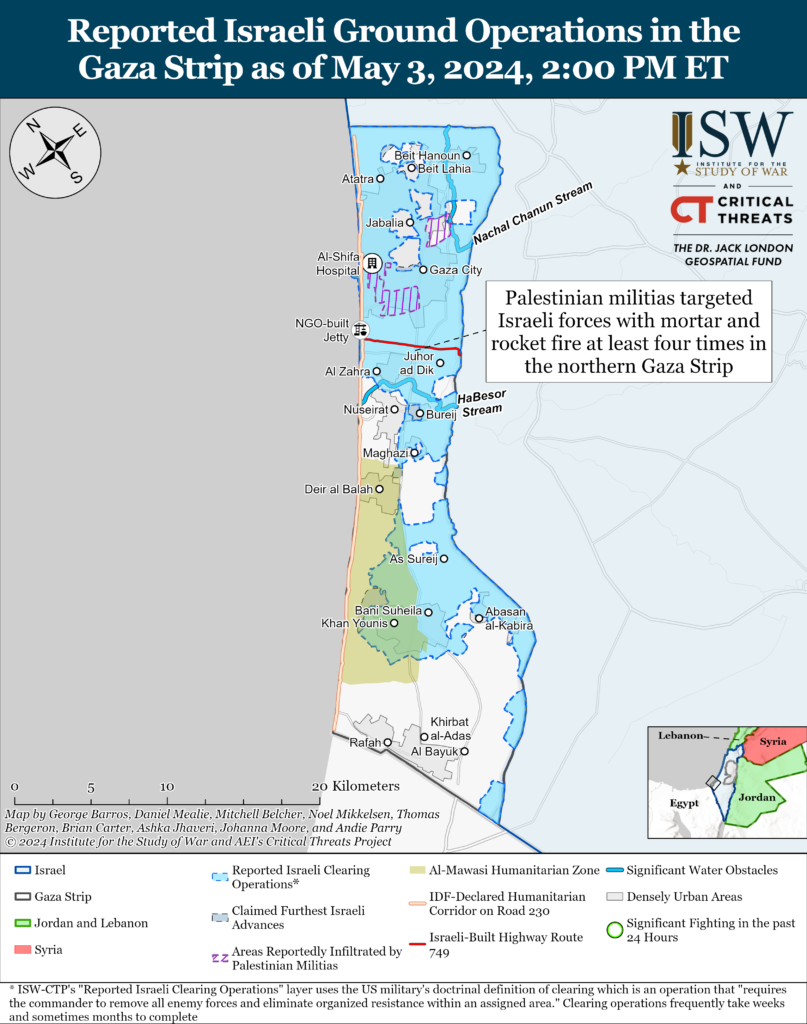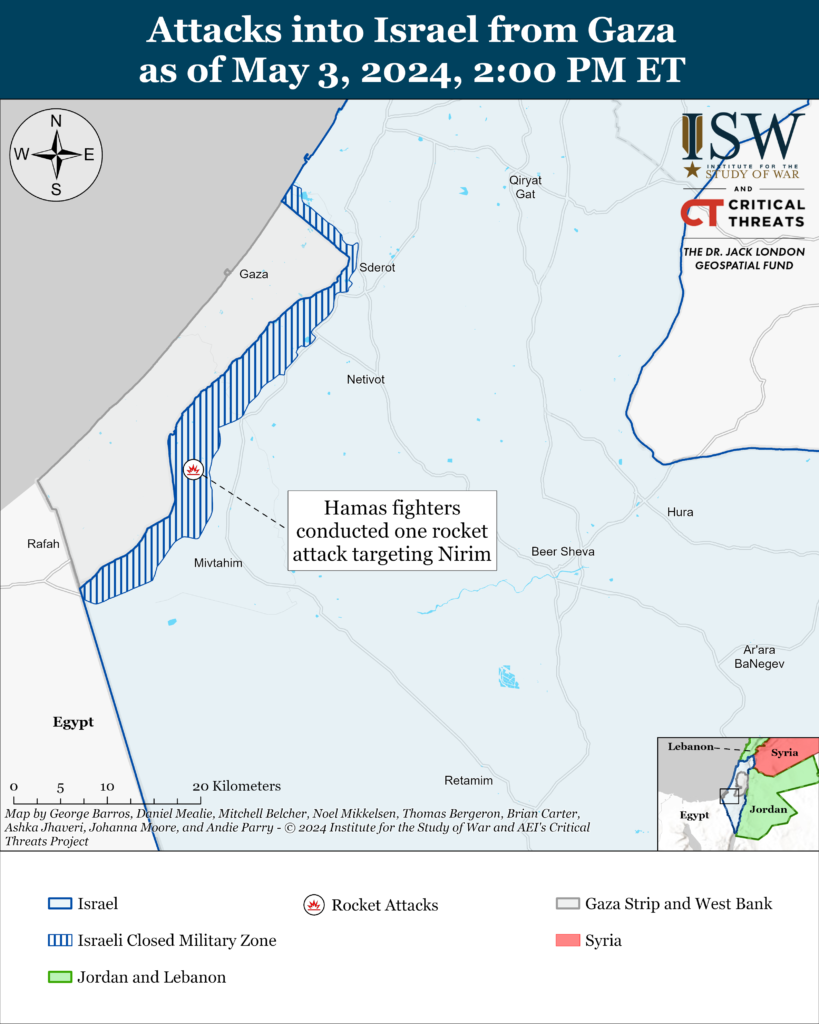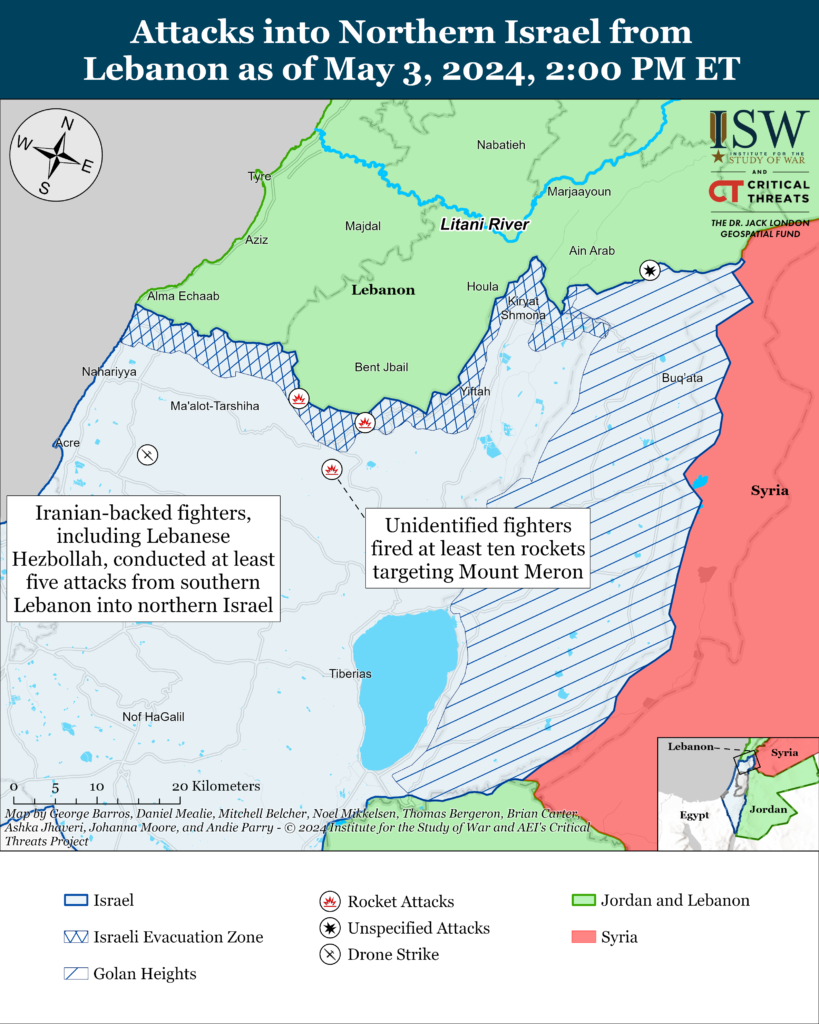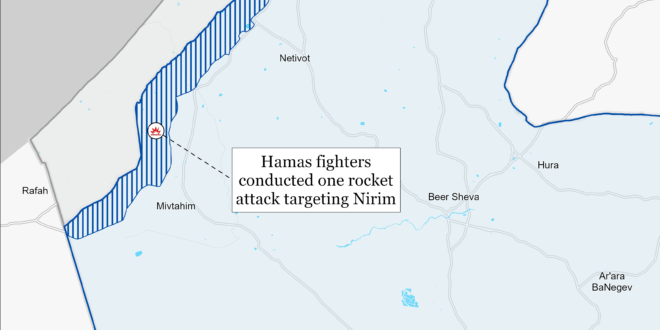The Houthi movement said it will expand targeting of maritime shipping into the Mediterranean Sea, which is probably part of an Iranian-led effort to impose an unofficial economic blockade on Israel. The Houthi movement announced on May 3 that it will begin targeting ships in the eastern Mediterranean that are bound for Israel. The Houthi military spokesperson called this the “fourth phase of escalation.” The Houthis’ Shahed-136 can reach the eastern Mediterranean.[i] Iran and its so-called “Axis of Resistance” have repeatedly called for an unofficial blockade on Israel in recent months.[ii] Tehran and its allies appear to be operating on the theory that severe economic disruption would compel Israel to accept defeat in the Gaza Strip and that such economic pressure could ultimately collapse the Israeli state. Iranian leaders have repeatedly said in recent months that part of their theory on how to destroy Israel revolves around stoking instability and terror in Israel to catalyze reverse migration away from Israel.[iii]
The Houthis will likely fail to disrupt trade around Israel’s Mediterranean ports in the same way that the Houthis did around the Red Sea. The Houthis have been somewhat successful in decreasing the amount of imports entering Israel from Eilat port. Eilat saw an 80 to 85% drop in revenue between November and December 2023.[iv] The Houthis can achieve this effect because the movement can launch dozens of short-range drones and missiles into the Red Sea and Gulf of Aden. The distances involved in targeting the Mediterranean Sea means that the Houthis have a much more limited suite of munitions to choose from and thus a more limited stockpile of individual systems to use. The Houthis also presumably lack a robust targeting regime in the Mediterranean Sea, whereas the Iranian Behshad supports Houthi targeting in the Red Sea and Gulf of Aden.[v]
The same capabilities that enable the Houthis to target the Mediterranean to impose costs on Israel can be used in future conflicts—including or excluding Israel—to threaten maritime shipping and impose costs on the West. Both the Houthis and Iran have expressed aspirations to improve their capabilities to enable attacks into the Indian Ocean and Straits of Gibraltar, thus preventing shipping from entering the Mediterranean Sea or traveling around the Cape of Good Hope.[vi] Attacks targeting these shipping lanes could severely impact global shipping prices. The Houthis or Iran could improve upon the capabilities they are currently employing in the Red Sea and Gulf of Aden to impose economic costs on the West in the future. The Houthis and Iran could impose these costs at times and for reasons of their own choosing.
Hamas is delaying its response to an Egyptian-proposed ceasefire that satisfies Hamas’ maximalist demands. The ceasefire proposal includes a three phased plan for the release of Israeli hostages, a ceasefire lasting up to five years, and the gradual withdrawal of all Israeli forces from the Gaza Strip. Hamas believes any ceasefire is an interim “rest” before Israel’s ultimate destruction.[vii] The head of Hamas in the Gaza Strip, Yahya Sinwar, is the key decisionmaker in the negotiations because he has control over Hamas’ forces in the Gaza Strip. Egyptian officials told the Wall Street Journal on May 3 that Sinwar has not yet responded to the proposal.[viii] Sinwar has previously refused ceasefire proposals.[ix] US and Israeli officials have noted since April 2024 that Hamas has been intransigent on negotiations and refusing to agree to a ceasefire despite Israeli concessions.[x]
The Netanyahu government is seeking regional involvement in a post-war plan for the Gaza Strip. Netanyahu’s government is considering shared “oversight” of the Gaza Strip with the United States and some Arab countries after the war according to Israeli officials cited by the New York Times.[xi] The United States, Egypt, Saudi Arabia, the United Arab Emirates would share responsibility for redevelopment, education, and security in the Gaza Strip for a period lasting between seven to ten years. Gazans would vote to join a unified Palestinian state with the West Bank after the oversight period. The proposal does not specify if the unified government would constitute a sovereign Palestinian state according to the New York Times. Unspecified Arab officials have rejected the plan because it does not outline a clear path towards a Palestinian state. Israel would share these responsibilities in exchange for diplomatic normalization with Saudi Arabia.
Key Takeaways:
- Yemen: The Houthi movement said it will expand its attacks into the eastern Mediterranean. The Houthis’ Shahed-136 can reach the eastern Mediterranean, but Houthi attacks into the Mediterranean will probably be less effective than their attacks into the Red Sea.
- The same capabilities that enable the Houthis to target the Mediterranean to impose costs on Israel can be used in future conflicts—including or excluding Israel—to threaten maritime shipping and impose costs on the West.
- Ceasefire Negotiation: Hamas is slowing its response to an Egyptian-proposed ceasefire that satisfies Hamas’ maximalist demands.
- Post-War Gaza Strip: The Netanyahu government is seeking Saudi, Emirati, US, and Egyptian involvement in the post-war Gaza Strip.
- Military Operations in the Gaza Strip: Palestinian militias conducted indirect fire attacks targeting Israeli forces in the Netzarim corridor.
- West Bank: Israeli security services seized a shipment of smuggled M4/M16 rifle components. These components cannot be assembled into complete rifles, but their existence implies additional shipments with the remaining components for a complete rifle.
- Iran: The Tehran interim prayer leader said that Iran’s April 13 attack targeting Israel served as a useful cross-border exercise between Iran and its regional partner and proxy militias. This suggests that Iran is learning from the April 13 attack to improve its capabilities for future operations.

Gaza Strip
Axis of Resistance objectives:
Erode the will of the Israeli political establishment and public to sustain clearing operations in the Gaza Strip
Reestablish Hamas as the governing authority in the Gaza Strip
Palestinian militias have targeted Israeli forces with mortar and rocket fire at least four times in the northern Gaza Strip since CTP-ISW’s last data cut off on May 2. The National Resistance Brigades and Palestinian Islamic Jihad (PIJ) fighters mortared Israeli forces operating in Sheikh Ajlin, in southwest Gaza City.[xii] PIJ fighters also mortared Israeli forces in an unspecified area of the Netzarim corridor.[xiii] Hamas fighters targeted Israeli forces in the Netzarim corridor using its Rajum rocket platform.[xiv]



Recorded reports of attacks; CTP-ISW cannot independently verify impact.
Hamas launched one rocket attack targeting Nirim on May 3.[xv]
West Bank
Axis of Resistance objectives:
Establish the West Bank as a viable front against Israel
Israeli forces have engaged Palestinian fighters in at least two locations in the West Bank since CTP-ISW’s last data cutoff on May 2.[xvi] Unspecified Palestinian fighters clashed with Israeli forces near Tulkarm on May 2 according to Palestinian media.[xvii] The Al Aqsa Martyrs‘ Brigade targeted Israeli forces and armored vehicles in Jaba, Jenin governorate, with ”machine guns” on May 3.[xviii]
The IDF interdicted a shipment of smuggled M4/M16 rifle components in an unspecified area of the Jordan Valley on May 3.[xix] The IDF reported it seized 14 bolt carrier groups and 30 upper receivers for M4/M16-pattern rifles. The individual pieces interdicted are not enough on their own to assemble an entire weapon. Smugglers have presumably tried or will try to smuggle the remaining 16 bolt carrier groups not in the shipment and the additional necessary pieces for a complete rifle into the West Bank. Israeli forces arrested the weapons smugglers.[xx] Unnamed Israeli officials have previously acknowledged that Israeli forces are not able to interdict every smuggling attempt at the Jordanian border
The United Kingdom imposed sanctions on May 3 on four individual Israeli settlers and two settler groups for inciting and perpetrating violence against Palestinian communities in the West Bank.[xxi] The United Kingdom stated that the groups and individuals were responsible for perpetrating human rights abuses.
Shin Bet arrested a 35-year-old Israeli settler on May 3 suspected for his involvement in the murder of a Palestinian man in April 2024.[xxii] Israel arrested the man in relation to settler violence targeting Palestinians in the West Bank following the kidnapping and subsequent murder of an Israeli boy on April 12.[xxiii]

This map is not an exhaustive depiction of clashes and demonstrations in the West Bank.
Southern Lebanon and Golan Heights
Axis of Resistance objectives:
Deter Israel from conducting a ground operation into Lebanon
Prepare for an expanded and protracted conflict with Israel in the near term
Expel the United States from Syria
Iranian-backed fighters, including Lebanese Hezbollah, have conducted at least five attacks from southern Lebanon into northern Israel since CTP-ISW’s last data cutoff on May 2.[xxiv] The IDF stated that Hezbollah fired a barrage of at least 10 rockets from Lebanon targeting unspecified sites near Mount Meron on May 3.[xxv] Israeli media reported that Hezbollah fired approximately 18 rockets towards the Mount Meron area.[xxvi] The IDF said that the rockets landed in open areas without injuries or material damage.[xxvii]
The IDF reported that it intercepted a drone over Julis, Lebanon on May 3. Unspecified fighters launched it from Lebanon on May 3.[xxviii]

Recorded reports of attacks; CTP-ISW cannot independently verify impact.
Iran and Axis of Resistance
Israel likely conducted an airstrike targeting a Syrian Arab Army (SAA) building south of Sayyida Zeinab, Rif Dimashq, on May 2. Syrian media reported that Israel conducted an airstrike targeting a Syrian state security headquarters near Najha, Rif Dimashq, resulting in the destruction of the building.[xxix] The Syrian Ministry of Defense stated that Israel’s airstrike injured eight SAA soldiers and caused material damage.[xxx] An unnamed Syrian security source told Reuters that the strike targeted a building operated by Syrian security forces and denied that Lebanese Hezbollah or Iranian forces operated the site.[xxxi]
Iranian Armed Forces General Staff Deputy Chief Brig. Gen. Aziz Nasir Zadeh discussed expanding military and defense cooperation with Azerbaijani Deputy Defense Minister Karam Mustafayev in Tehran on May 3.[xxxii] Mustafayev is also the army commander of the Nakhchivan Autonomous Republic, which is an Azerbaijani exclave in western Armenia.[xxxiii] The Iranian regime has historically opposed Azerbaijani and Turkish efforts to establish the Zangezur corridor between Azerbaijan proper and Nakhchivan because such a corridor would sever Iran’s land access to Russia and Europe via Armenia.[xxxiv] It is unclear whether Armenia’s growing estrangement with Russia has changed Iran’s position on this issue, however. Azerbaijan and Iran agreed in October 2023 to build a transportation route between Azerbaijan and Nakhchivan via Iranian territory as an alternative to the Zangezur Corridor.[xxxv]
Tehran Interim Friday Prayer Leader Mohammad Hassan Abu Torabi Fard stated on May 3 that Iran’s recent drone and missile attack targeting Israel was an “exceptional opportunity” to display Iranian military capabilities.[xxxvi] Torabi Fard added that the display of Iranian weapons in the attack could “create wealth” for Iran. These statements are consistent with CTP-ISW’s assessment that Iran is using its attack on Israel to promote Iranian military exports.[xxxvii] Torabi Fard also stated that Iran’s attack on Israel was a “valuable experience” for Iran’s Axis of Resistance. He described the attack as a “large cross-border exercise.”[xxxviii] Torabi Fard’s characterization of the attack as a military exercise is consistent with CTP-ISW’s assessment that the Iranian regime is very likely studying its attack on Israel to understand how to defeat US and partner air defenses in the future.[xxxix]
The Islamic Resistance in Iraq—a coalition of Iranian-backed Iraqi militias—claimed that it conducted two long-range missile attacks targeting Beer Sheva and Tel Aviv on May 2.[xl] Israeli officials and media have not commented on the attacks at the time of this writing. The Islamic Resistance in Iraq claimed that it used “Arqab” cruise missiles in the attacks.[xli] The Islamic Resistance in Iraq previously claimed two “Arqab” cruise missile attacks targeting Israel in January 2024.[xlii] The Islamic Resistance in Iraq separately claimed that it conducted an attack targeting an unspecified “vital target” in the Dead Sea using “appropriate weapons.”[xliii]
Iranian-backed Iraqi militia Asaib Ahl al Haq Leader Qais al Khazali reiterated that Iraq needs to expel foreign forces during a speech on May 3 for the anniversary of Asaib Ahl al Haq’s founding.[xliv] Khazali also emphasized the need to achieve “monetary sovereignty” and to elect a new parliament speaker.
US Central Command (CENTCOM) conducted a preemptive strike targeting three one-way attack drones in Houthi-controlled areas of Yemen on May 2.[xlv] CENTCOM determined that these systems presented an imminent threat to US, coalition and merchant vessels in the region.

 Eurasia Press & News
Eurasia Press & News




